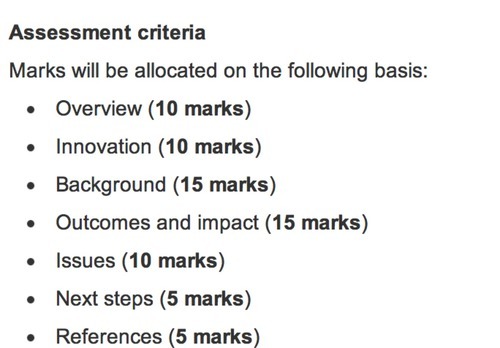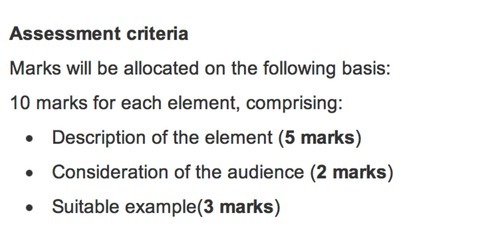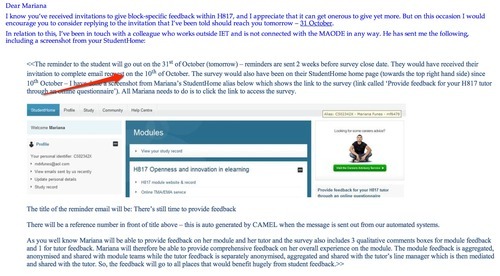Animated gif by @gifadog source video: Beowulf Animated (1998)
Made to support #HEAmonsters conference presentation by @mdvfunes “Wrestling your Inner MOOC” .
Animated gif by @gifadog source video: Beowulf Animated (1998)
Made to support #HEAmonsters conference presentation by @mdvfunes “Wrestling your Inner MOOC” .
I noticed this weekend that I have been distracted.
As I got involved in the ‘un-course’ Rhizomatic Learning run by Dave Cormier over at P2PU, I have neglected my DS106 life. This stops today. I have chosen this space as my home and community on the web and my cognitive surplus will come here first and only if there is any left will it go to other hashtag classrooms. Depth of learning happens through sustained practice, breadth is all that is acquired by being a MOOC tourist.
So, rather than going elsewhere to write, I am here reflecting on the most interesting conversation I have had on the web this week. I cannot remember how I came across him, but Alastair Creelman wrote a post that made me stop MOOC window shopping and pay attention.
He asks in the first paragraph:
Are we all so busy sharing that we don’t stop to wonder if anyone is listening?
The post moves on to wonder what is happening with all the content we are storing in servers around the world:
We’re all busy filling the world’s servers with information yet only a fraction of it is seen by more than a handful of people, if that. As the mountain of titles rises the chances of anyone reading your efforts diminish.
Alastair then moves on to wonder about ‘dissemination’ and its value:
On top of this there is all the time spent sharing these resources via Twitter, Facebook, Google+, Scoopit and many, many more. Here we’re not creating anything new, simply creating echoes of someone else’s content.
of course there are those who think that these echoes are important in this age of abundance and there is a skill in echoing:
information discovery plays such a central role in how we make sense of the world in this new media landscape, then it is a form of creative labor in and of itself
Alastair’s post ends with a plea that we, those of us in distributed educational technology or #DEdTech as Jim Groom likes to call it,
discuss ways of encouraging digital recycling, reducing background noise and maybe choosing not to add new resources unless absolutely necessary. Just as the physical world is producing more products than can be consumed, we’re producing more digital content than can be used.
I think we need to engage with this conversation for its own sake, not from a defensive frame.
An interesting dialogue is evolving on Alastair’s post and it shows that this is a sensitive issue for many – quotes that follow are from the comments on the post – I fear that it touches on the individual ‘right’ some of us feel we have to produce and create content at will. From an educational point of view, the argument seems to be that it is unimportant if content lies unread in the world’s huge data centers,

as ‘the metaphor is often more important than than the reality’ that it will no be read because,
if nothing else curation may give us a sense of our place in universe. Pretty insignificant but pretty essential all the same.
We can dialogue about the ‘essentialness’ of human beings’ place in the universe, but the educational argument here is that we use technology as a tool for self-development and that digital landfills are a price worth paying. The learning justifies the means.
I say it again: I think we need to engage with this conversation for its own sake, not from a defensive frame. Yes, some people believe in their inalianable right create content, much in the same way as others believe that they can keep consuming regardless of the actual landfills. This does not remove the need for a conversation that tackles the negative consequences of us exercises our individual right.
Alastair starts the exploration with this suggestion:
Maybe curation can be expanded to include wise management of resources such as pruning/deleting outdated and irrelevant material. Maybe resources could have a sell-by date after which they simply vanish.
Sell by date for resources! Now, there is an idea worth spreading.
He further adds,
I love to share but when a couple of billion people share every photo, bookmark, idea, greeting, film or whatever we’re saving information that should be ephemeral. Snapchat has the right idea – send a photo that disappears completely after 10 seconds. When the ephemeral becomes permanent…
My last comment before deciding to write this post was,
“All wise thoughts have been thought thousands of times; but to make them truly ours, we must think them ourselves.” Johann Wolfgang von Goethe
Of course Goethe never said we must blog, curate and tweet them 🙂
The accumulation of unused resources and the phenomenon echoing other people’s content without deep listening is a side of open education that deserves attention without rationalisation about people’s rights to create content and/or the social/interpersonal impact of having a personal cyberinfrastructure, these are sides of the same coin not mutually exclusive issues.
In blogging about design during Headless 13, I talked about the consequences of us encouraging our students to produce more and more content in the name of creativity. Some took my comments then as a personal attack on their right to produce it rather than social commentary.
I clarified:
“My current reflections are about the unintended global and long term consequences of our virtual habits, your reflections highlight the individual argument about how we benefit from what we own, produce and create. Just as I see the negative consequences of individualistic pursuits in landfills in our physical world, I also fear for our open web as we keep producing, throwing stuff away and engaging with content from a cumulative but non-reflective perspective.”
As we worship at the altar of ‘make art, damn it!’ may we also take time to consider the consequences in the physical of non-reflective consumption. And if you need a reminder of these, please make yourself a cup of tea and take time to watch this heart breaking animation. It was watching this little heart breaking treasure this morning that led to this post.
Sell-by dates for data? Digital Literacies that include a sense of guardianship for what we produce? Questioning our god-given to keep hoarding content just because it is virtual? Let’s keep the ideas coming without changing the conversation to ‘But, we have the right to create!’ We do and, if we stop to reflect, we may see unintended consequences we do not like?
When I started DS106 and this blog, I heard somebody advising a participant that if he was frustrated by the way a large corporation had treated him, then he should just ‘DS106 it!’. I remember thinking it was interesting to advise the use of creativity to work through frustration. DS106 as art therapy. I have since learnt that it also means DS106 as political activism, as there are many examples in the community of producing art as a way to make political or social critique.
Life has thrown me a lemon in the form of the systems and procedures of the Open University (OU) which have led to me formally withdrawing from their Masters on Online and Distance Education (MAODE) and requesting that all my personal data held behind their registration wall be deleted. I filed a generic email under ‘appeals and complaints’ – which will probably only give me yet another automated email as a response – after 3 months of trying very hard to hold a reasonable conversation with those responsible for the module and the Master as a whole. All to no avail. The trail ended with an anonymous feedback form with a set of assumptions that will lead to my tutor being held responsible for the issues I have had, rather than a review of the systems and procedures of an educational institution that in the name of fairness is running a Masters programme teaching students critical thinking by numbers.
The rest of this post offers the feedback I was unable to offer confidentially.
MAODE has several modules one of which is the Openness and Innovation module (#H817). At the end of the module it asks its students for the following in order to assess that they have reached the apropriate standards:

and a further 10% is broken down as follows:

Am I the only one seeing the irony in this assessment procedure? This is a Masters programme. This is a module that teaches openness and innovative approaches to learning. However, in signing up I knew that I would have to adapt.
I understood that if I wanted to continue with the course then I would need to adjust to this way of learning. When asked, I said that whilst I was enjoying what I was learning, I was not enjoying how I was learning it. The module has numerous pedagogical issues that I will not be discussing here, but I did want to discuss with faculty. I asked my tutor, she referred me to the head of the module, the head of the module referred me to the director of the programme, the director of the programme sent me the link to the anonymous feedback form.
I need to say that I have always had very idealistic notions about the OU and how it opens up education to all. This was my first real experience with it, and I must admit to being shocked by the reductionistic and disposable assignment nature of its pedagogical approach. In completing my first module with them, I kept making allowances for the shortcomings and doing my best to offer feedback and to attempt to navigate the constraints whilst looking for my learning needs to be met. I contacted one of the OU tutors, who has been an exemplary role model of open education, Paige Cuffe.
@paigecuffe thanks Paige. Want to offer feedback on modules. Also – I do not want 2 do compulsory one. I don’t need it, want 2 do others.
— Mariana Funes (@mdvfunes)
She was supportive of my intentions:
@mdvfunes worth talking to them – just taking control of your learning…
— paige cuffe (@paigecuffe)
I failed in my good natured attempts to offer feedback beyond anonymous surveys. I was frustrated beyond my levels of tolerance by the ‘closed-due-lack-of-interest’ approach my requests for dialogue met.
I was even accused of not being polite enough, as I got close to my third month and 5th person asking for a phone or face to face conversation to discuss my learning needs and offer feedback:
Thanks, Mariana, for your comments. However, you have strayed beyond the reasonable (and the polite) when you write:
“It is really not great practice to keep passing unhappy customers on to other members of faculty to get them out of your inbox.”
I was pointing you to the person who is in the best position to take account of your feedback.
I had only one option left and I chose not to take it. I could have contacted the one person that had made this #817 Open University module worth doing, Martin Weller. Martin, like Paige, is an exemplar open scholar. Engaging on the open web, sharing resources and certainly not trying to pass on OU students, or anyone else for that matter, so at to clear his inbox. He has always been helpful, he ran my first MOOC and opened my eyes to what adult education using the open web could really be like beyond the walled garden of the LMS. Yes, I could have contacted him and he would have listened. But it is not his job to deal with unhappy OU students. Particularly, when he works so hard at giving the OU a positive profile. This is why I chose to go through the appropriate channels. How should the OU have responded? Not the way it did in my view.
In my view, the right thing would have been for the head of H817 or the director of the Masters I was enrolled in to do me the courtesy of listening. I am, after all, paying two thousand five hundred pounds sterling for the privilege of being taught on the module. I have rights. Of course, if I were invested in getting yet another postgraduate degree I would not feel quite so free to challenge the powers that be. Those very people who control the pass/fail levers. Thankfully, I already have as many degrees as I need, and a reputation in my field as a chartered research psychologist specialising in adult learning. I do not need another degree.
I wanted to engage in dialogue as equal partners with the Open University faculty. I was, instead, treated as a nuisance and forced to make the choice to withdraw from a course I really wanted to complete just because I believe in the ideals of the Open University and wanted to be part of its community.
I have met wonderful people through H817open and through the closed LMS #H817. The community is not at fault. It is the systems and procedures of an institution that used to be at the leading edge, is now drowning in red tape and made up of silos that do not communicate with each other. I would have wanted to engage constructively with faculty to offer a view of one student’s experience and how their pedagogy may be affecting dropout rates. It was not to be. My final communication with the director of the Masters Programme after my repeated requests to talk, simply reminded me that I had been sent an email to give feedback and had not acted on it. It was clearly my fault that my feedback had not got into the system and may be a reminder would lead me to comply.

I did comply. I filled in the form, but the form is not designed for dialogue but for the same thing that all OU formal communications seems to be – ensuring that the organisation is not held responsible for any complaints. I lost track of the interactions I had that were not about engagement but about fault finding. I summed up my form filling experience in my last email to the director as follows:
It seemed appropriate [to fill in the form] to help future students and yourselves. Your form is biased and does not allow for a flexible and open feedback loop. The way the form is designed it will put the responsibility on my tutor for my discontent. This would be a mistake. She has struggled with the same things as I have: really trying to do a good job as procedures, systems and work conditions have conspired against her being able to deliver.
The module (H817) was not ready to be delivered and you have made your students pay for experimentation and refinements. I paid for access to library and faculty and all I got were excuses from the library and apologies from my tutor as she struggled with the system. The only faculty member that offered what I paid for was Martin Weller. Everyone else was absent beyond writing a Moodle book. It was only when students insisted on getting contact that we got 1 hangout to clarify a confused block and project. I was paying for more than that.
I close this post with the best example of the systemic pattern I encountered at the OU. I spent 6 months trying to get access to the library services I was paying for and failing. Unless references could be acquired directly online no support to speak of is available. A number of ignored emails later, I contacted my tutor and asked for help. She could not help me. She did, however, suggest I contacted their web chat service, as it was an efficient service.
If you have made it this far, make yourself a cup of tea and listen to my podcast ‘The Helpful web-chat librarian’. I could not make it up.
Good bye Open University, hello MOOC life!
World’s biggest MOOC enrolls 7.2 billion people– it’s called “Earth”
— Alan Levine (@cogdog)
Copyright © 2024 DS106 on the couch
Theme by Anders Noren — Up ↑